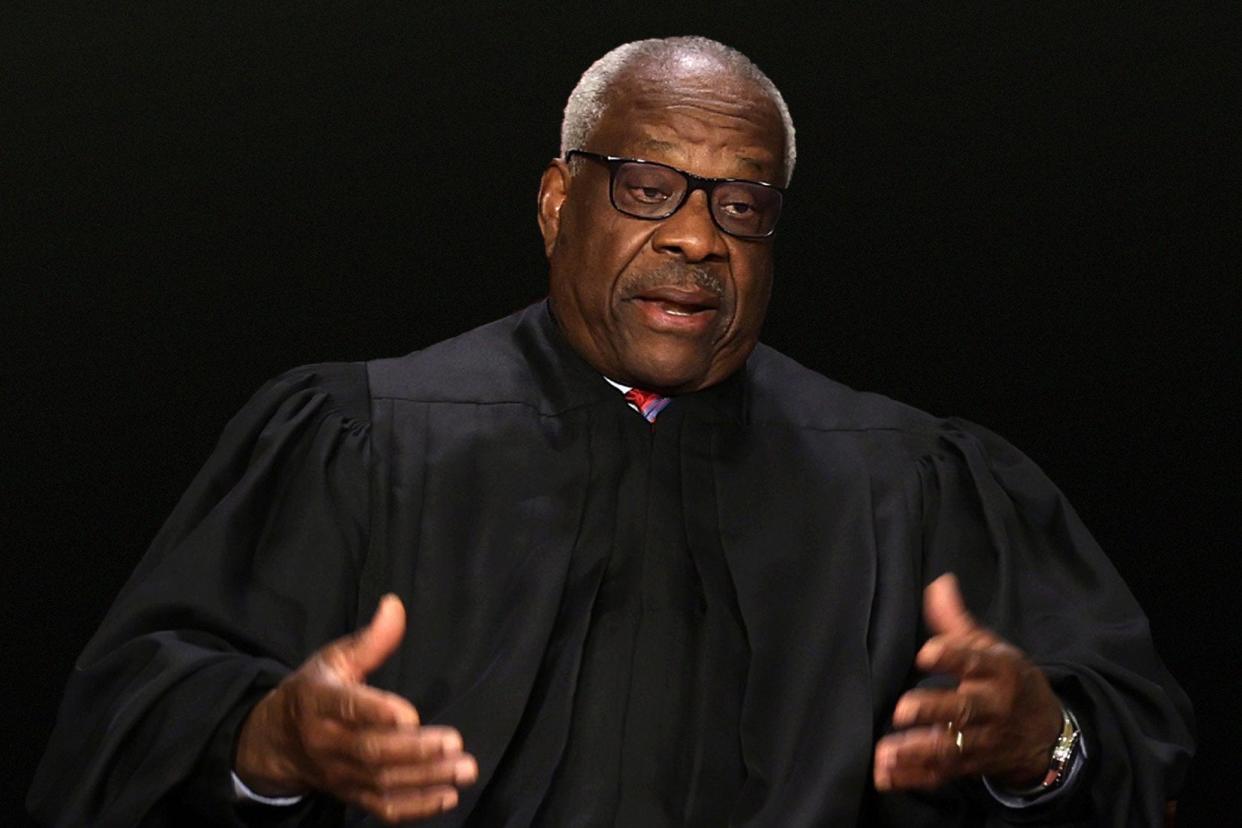Clarence Thomas’ Corrected Ethics Disclosure Form Is Not Actually Correct

- Oops!Something went wrong.Please try again later.
- Oops!Something went wrong.Please try again later.
- Oops!Something went wrong.Please try again later.
If there was any doubt about Supreme Court Justice Clarence Thomas’ identification with the Republican establishment, it dissolved last week when he filed his annual financial disclosure report, which was accompanied by the simultaneous release of a statement from his attorney scorching his “left wing” critics for engaging in “political blood sport.” The statement, unmistakably authorized by Thomas himself, set a new benchmark for partisan denunciations from a Supreme Court justice. What’s perhaps worse, though, is that Thomas’ amended—and supposedly now correct—disclosure report continued to conceal the value of largesse from his conservative benefactor, Harlan Crow.
First, the politics of it. Of the many thousands of attorneys in Washington, D.C., Thomas chose to be represented by Elliot Berke, whose practice has been largely devoted to counseling prominent Republicans, including House Speaker Kevin McCarthy and House Majority Whip Tom Emmer, as well as the National Republican Congressional Committee itself. His website boasts of running “election day war rooms for presidential and gubernatorial candidates.”
A justice concerned with even a minimal appearance of neutrality would have retained an apolitical lawyer. Instead, Thomas chose an openly partisan spokesman who all but declared war on the “Democratic members of Congress” who dared to seek additional information about Thomas’ previously undisclosed luxury vacations as the guest of billionaire Harlan Crow.
According to legal commentator David Lat, Thomas himself is not responsible for Berke’s diatribe. “As a member of the Supreme Court, Justice Thomas had to show restraint in responding to the ethics allegations against him, but his lawyer didn’t,” Lat wrote. That is wrong. Berke’s statement was pointedly released “On behalf of Client Justice Clarence Thomas.” A lawyer as accomplished as Berke would never issue such a statement without his client’s specific approval, which makes Thomas responsible for both its language and tone.
Berke’s over-the-top ideological taunts undermine the credibility of his “confident” assurance that “there has been no willful ethics transgression, and any prior reporting errors were strictly inadvertent.” While a nonaligned lawyer might be trusted to have conducted a dispassionate review of Thomas’ past disclosures, Berke’s red-meat rhetoric has the precise opposite effect, suggesting, to all but Thomas’ many apologists, that the outcome was predetermined.
Thomas’ level of inattention to disclosure obligations, as revealed by last week’s amended form, is shocking for a Supreme Court justice who, as observed by Slate’s Dahlia Lithwick and Mark Joseph Stern, “applies one standard to himself and another to everyone else,” including indigent criminal defendants, whose inadvertent errors of timing and procedure are never excused by Thomas, even when they are facing the death penalty.
It is especially galling for Thomas to claim inadvertence because this is not the first time it has happened. In 2011, Thomas amended 20 years of disclosure reports from which he had “inadvertently” failed to include his wife’s employment “due to a misunderstanding of the filing instructions.” In fact, Virginia Thomas had earned at least $686,000 from the conservative Heritage Foundation during that period. The excuse was barely plausible then, given the simple language of the form, and it beggars belief that a Supreme Court justice, whose job includes interpreting complex statutes and regulations, would continue to take his statutory reporting obligations so lightly.
The thing is, even after this latest amended filing, Thomas is still at it. Thomas’ latest report, for the first time, includes disclosure of a Crow-financed vacation, in this case a week at Crow’s private resort in the Adirondacks, where the Thomases had been enjoying annual vacations for many years. But that disclosure raises an entirely new question.
Having acknowledged that he and his wife had been “guests” of Harlan Crow, Thomas added an explanatory note stating that the “transportation, meals, and lodging” were listed “under ‘reimbursements’ not gifts,” according to “advice from the staff of the Judicial Conference Financial Disclosure Committee (July 10).”
The difference in categories is significant because gift reports must include their “value” while reimbursements need not. Although Thomas claims that this unusual categorization is “consistent with previous filings by other filers,” he gives no examples. The other justices’ reported reimbursements were all for teaching or speaking engagements at law schools—including Notre Dame, Harvard, and Northwestern—and foundations or conferences. (Thomas also listed two reimbursements for speaking engagements in Dallas, with transportation provided by Crow.)
No other justice listed an expense-paid vacation as a reimbursement, with the attendant concealment of its value.
Thomas’ motivation for the categorization seems obvious. The Financial Disclosure Committee’s rationale for apparently allowing it is, to put it politely, opaque. The Judicial Conference’s Guide to Judiciary Policy defines “reimbursement” as the payment or repayment for travel-related expenses “other than gifts.”
If nothing else, Thomas and the Judicial Conference Financial Disclosure Committee now ought to disclose the July 10 correspondence authorizing the nondisclosure of the value of his free vacation.
Thomas and his counsel will no doubt continue to rail at so-called “weaponized ethics allegations.” They would do better to heed the commentary to the Code of Conduct for United States Judges, applicable to the lower federal courts, but thus far unadopted by the Supreme Court: “A judge must expect to be the subject of constant public scrutiny and accept freely and willingly restrictions that might be viewed as burdensome by the ordinary citizen.”
It isn’t a blood sport; it’s democracy.

